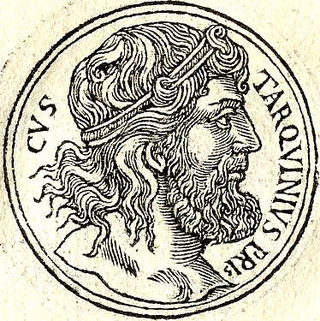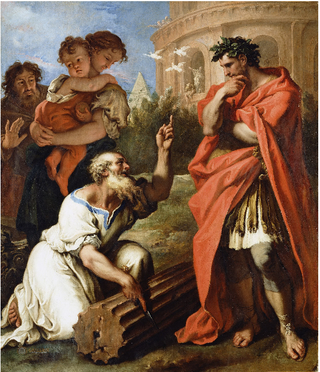Related Research Articles

Lucius Tarquinius Priscus, or Tarquin the Elder, was the legendary fifth king of Rome and first of its Etruscan dynasty. He reigned for thirty-eight years. Tarquinius expanded Roman power through military conquest and grand architectural constructions. His wife was the prophetess Tanaquil.

Lucius Tarquinius Superbus was the legendary seventh and final king of Rome, reigning 25 years until the popular uprising that led to the establishment of the Roman Republic. He is commonly known as Tarquin the Proud, from his cognomen Superbus.

According to Roman tradition, Lucretia, anglicized as Lucrece, was a noblewoman in ancient Rome, whose rape by Sextus Tarquinius (Tarquin) and subsequent suicide precipitated a rebellion that overthrew the Roman monarchy and led to the transition of Roman government from a kingdom to a republic. The incident kindled the flames of dissatisfaction over the tyrannical methods of Tarquin's father, Lucius Tarquinius Superbus, the last king of Rome. As a result, the prominent families instituted a republic, drove the extensive royal family of Tarquin from Rome, and successfully defended the republic against attempted Etruscan and Latin intervention.

Lucius Junius Brutus was the semi-legendary founder of the Roman Republic, and traditionally one of its first consuls in 509 BC. He was reputedly responsible for the expulsion of his uncle the Roman king Tarquinius Superbus after the suicide of Lucretia, which led to the overthrow of the Roman monarchy. He was involved in the abdication of fellow consul Tarquinius Collatinus, and executed two of his sons for plotting the restoration of the Tarquins.

Tanaquil was the queen of Rome by marriage to Tarquinius Priscus, fifth king of Rome.

The Battle of Lake Regillus was a legendary Roman victory over the Latin League shortly after the establishment of the Roman Republic and as part of a wider Latin War. The Latins were led by an elderly Lucius Tarquinius Superbus, the seventh and last King of Rome, who had been expelled in 509 BC, and his son-in-law, Octavius Mamilius, the dictator of Tusculum. The battle marked the final attempt of the Tarquins to reclaim their throne. According to legend, Castor and Pollux fought on the side of the Romans.

The Rape of Lucrece (1594) is a narrative poem by William Shakespeare about the legendary Roman noblewoman Lucretia. In his previous narrative poem, Venus and Adonis (1593), Shakespeare had included a dedicatory letter to his patron, the Earl of Southampton, in which he promised to compose a "graver labour". Accordingly, The Rape of Lucrece has a serious tone throughout.

The gens Junia was one of the most celebrated families of ancient Rome. The gens may originally have been patrician, and was already prominent in the last days of the Roman monarchy. Lucius Junius Brutus was the nephew of Lucius Tarquinius Superbus, the seventh and last King of Rome, and on the expulsion of Tarquin in 509 BC, he became one of the first consuls of the Roman Republic.

Publius Valerius Poplicola or Publicola was one of four Roman aristocrats who led the overthrow of the monarchy, and became a Roman consul, the colleague of Lucius Junius Brutus in 509 BC, traditionally considered the first year of the Roman Republic.

The gens Tarquinia was a plebeian family at ancient Rome, usually associated with Lucius Tarquinius Priscus and Lucius Tarquinius Superbus, the fifth and seventh Kings of Rome. Most of the Tarquinii who appear in history are connected in some way with this dynasty, but a few appear during the later Republic, and others from inscriptions, some dating as late as the fourth century AD.
Demaratus, frequently called Demaratus of Corinth, was the father of Lucius Tarquinius Priscus, the fifth King of Rome, and the grandfather or great-grandfather of Lucius Tarquinius Superbus, the seventh and last Roman king.

Sextus Tarquinius was one of the sons of the last king of Rome, Lucius Tarquinius Superbus. In the original account of the Tarquin dynasty presented by Fabius Pictor, he is the second son, between Titus and Arruns. However, according to Livy and Dionysius of Halicarnassus, he was either the third or first son, respectively. According to Roman tradition, his rape of Lucretia was the precipitating event in the overthrow of the monarchy and the establishment of the Roman Republic.

Lucius Tarquinius Ar. f. Ar. n. Collatinus was one of the first two consuls of the Roman Republic in 509 BC, together with Lucius Junius Brutus. The two men had led the revolution which overthrew the Roman monarchy. He was forced to resign his office and go into exile as a result of the hatred he had helped engender in the people against the former ruling house.
Arruns Tarquinius was the younger son of Demaratus of Corinth, who migrated to the Etruscan city of Tarquinii in the seventh century BC. He died shortly before his father, leaving his wife pregnant. When Demaratus died, he left no inheritance for his grandson, also named Arruns, who was thus born into poverty, although Demaratus had been wealthy. The child came to be called Egerius, meaning "the needy one."

Arruns Tarquinius, commonly called Egerius, was a member of the royal family of early Rome.
Arruns Tarquinius was the brother of Lucius Tarquinius Superbus, the seventh and last King of Rome.

Tullia Minor is a semi-legendary figure in Roman history who can be found in the writings of Livy, Cicero, and Dionysius of Halicarnassus. She was the last queen of the Roman Kingdom.

In Rome's early semi-legendary history, Tarquinia was the daughter of Lucius Tarquinius Priscus, the fifth king of Rome,. Her father, Lucius Tarquinius Priscus, gave her in marriage to Servius Tullius, the sixth king of Rome. She was the mother of Lucius Junius Brutus, who overthrew the monarchy and became one of Rome's first consuls in 509 BC. She had another son, who was put to death by Superbus after he took the Roman rule from Servius.
Titus Tarquinius was one of the sons of the last king of Rome, Lucius Tarquinius Superbus. According to Livy and fragments of the first Roman historian, Fabius Pictor, he was the eldest son; however, Dionysius of Halicarnassus claims he was not.

The overthrow of the Roman monarchy was an event in ancient Rome that took place between the 6th and 5th centuries BC where a political revolution replaced the then-existing Roman monarchy under Lucius Tarquinius Superbus with a republic. The details of the event were largely forgotten by the Romans a few centuries later; later Roman historians invented a narrative of the events, traditionally dated to c. 509 BC, but this narrative is largely believed to be fictitious by modern scholars.
References
- Citations
- ↑ Cornell 1995, p. 123.
- ↑ Gantz 1975, p. 544.
- ↑ Lomas, Kathryn (2018). The rise of Rome: from the Iron age to the Punic wars. Cambridge: Harvard University Press. pp. 128–29. ISBN 978-0-674-65965-0. OCLC 1038428239.
- ↑ Livy, 1.56.
- ↑ Livy, 1.60.
- ↑ Broughton 1951 , p. 1, citing Livy , 2.6–7; Dion. Hal. Rom. Ant., 5.15–17.
- ↑ Cornell 1995, p. 439 n. 3.
- Sources
- Broughton, Thomas Robert Shannon (1951). The magistrates of the Roman republic. Vol. 1. New York: American Philological Association.
- Cornell, Tim (1995). The beginnings of Rome. London: Routledge. ISBN 0-415-01596-0. OCLC 31515793.
- Gantz, Timothy Nolan (1975). "The Tarquin dynasty". Historia: Zeitschrift für Alte Geschichte. 24 (4): 539–554. ISSN 0018-2311.
- Livy (1905) [1st century AD]. . Translated by Roberts, Canon – via Wikisource.
